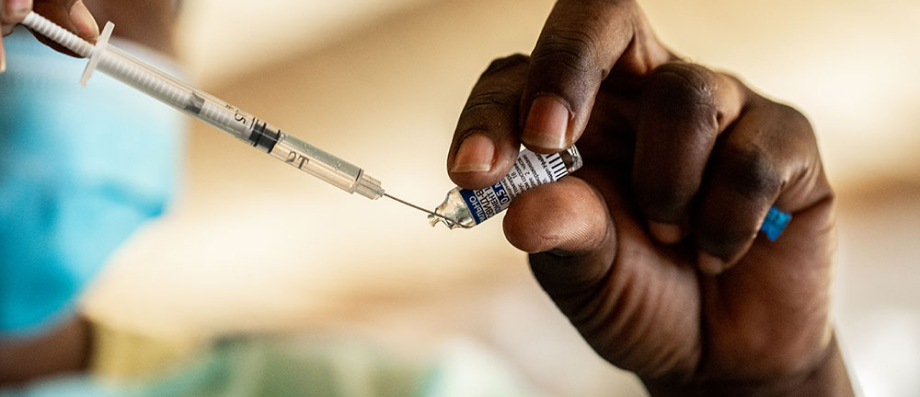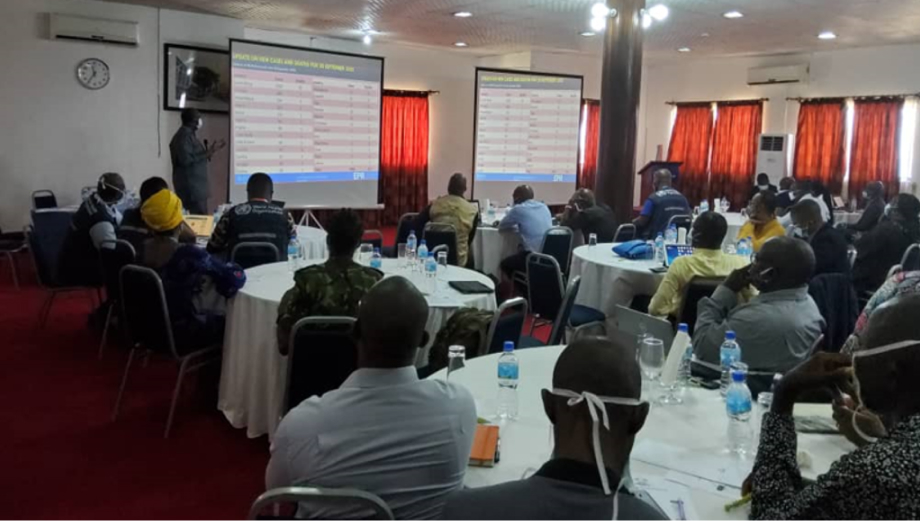Progress report African region 21 - 2.12. Integrated action and innovations

In cross-cutting areas such as innovation, digital health, research, laboratories, health information, primary health care and antimicrobial resistance, WHO-AFR continued to provide integrated support across technical programme areas. Among achievements, a database of more than 1000 technological innovations for COVID-19 was created to improve access to information on new approaches and tools. Intra-action reviews (IARs) were conducted in 20 countries; they constituted a collective learning exercise based on shared experiences and challenges and bottleneck recognition, which informed the updating of response plans and strengthened response structures.
Capacity to diagnose COVID-19 reached all 47 countries in the Region early in the year, with South Africa and Senegal having been the only countries able to do so at the start of the pandemic. With the support of WHO-AFR, four additional countries introduced polymerase chain reaction testing for the first time. Along with reliable antigen-detecting rapid diagnostic tests and effective access to easy-to-use tools, countries have been urged to scale up testing. Also, on laboratory-related innovation, WHO-AFR and Africa CDC, working in collaboration, launched the COVID-19 network of genome sequencing laboratories, and support is being provided to rapidly expand genetic surveillance capacities across the continent.
On a related note, improving data and information management on the continent has been at the top of AFRO’s priority activities. To better monitor health service disruptions and utilization by communities during the pandemic, a regional dashboard was created, and is being used by 27 countries, reflecting data from almost 7000 health facilities. Highlighted over the past year, gaps in mortality surveillance and civil registration and vital statistics are being addressed through the development of road maps, training and integrating the use of electronic medical certificates for cause of death. Along similar lines, under WHO AFRO guidance, Kenya, Namibia and Rwanda started preparations to introduce digital health platforms as part of strengthening information systems. Digital solutions were also found in other countries, with a new mobile application for case referral introduced in South Sudan.
At the reporting and academic level, the African Advisory Committee for Health Research and Development (AACHRD) supported young scientists from 20 countries to develop scientific papers related to universal health coverage and the Sustainable Development Goals. WHO AFRO also co-drafted and contributed information to at least 10 academic journals and medical trade articles, in addition to WHO-produced white papers.
in the African Region
At a Forum convened by WHO from 21 to 25 June, decision-makers from government, academia, the international community, and research institutions discussed local production and technology transfer for national pharmaceutical and vaccines production. Participants were led in the discussions by Algeria, Ghana, Kenya, Rwanda, Ethiopia, Nigeria, Senegal and South Africa, which have already embarked on setting up capacities to manufacture vaccines.
The Forum responded to Africa’s stark reality, where imports account for 70% to 90% of all medicines consumed, with tremendous implications on the capacity of people – and national health systems – to afford even the most basic medications. With countries unable to source, procure and dispense lifesaving oxygen (O²) to patients, followed by dire shortages of vaccines on the entire continent, COVID-19 renewed Africa’s commitment to reduce the continent’s dependence on imported medical products.
Simultaneously, the discussion tackled a constant witnessed on the continent of fake – and often cheaper – or illegal medications. This calls for more robust regulatory systems, quality control and internationally standardized medicine manufacturing, in line with the African Union’s Pharmaceuticals Manufacturing Plan for Africa. Together with the United Nations Economic Commission for Africa (ECA) and the United Nations Industrial Organization (UNIDO), WHO supports regulatory system strengthening to ensure better quality and prices for medicines bought and sold in Africa. Better regulations create an enabling environment for the domestic pharmaceutical industry and curb trafficking in falsified or dangerous medications, a marked issue during the COVID-19 crisis.

WHO / Booming – Carlos Cesar
Tracking progress of COVID-19 intra-action review recommendations in Sierra Leone
COVID-19 is a protracted pandemic that is likely to remain with us for quite some time despite the recent gains in vaccination. For this reason, countries will need to periodically assess the situation to determine whether to scale up the response in case of resurgence or scale it down if the situation is under control. One strategy to assist with this determination is conducting intra-action reviews (IAR).
In Sierra Leone, WHO supported the first COVID-19 IAR in September 2020. It was about the fifth country globally and the second in Africa to have done so. The main goal of the IAR was to generate sufficient information on critical issues affecting the COVID-19 response that would guide the government on strategies to sustain the gains and improve on the outcome of the response. The following six main thematic technical coordinating structures were reviewed: National Coordination, Surveillance, Laboratory, Case Management, Risk Communication and Community Engagement and Food and Nutrition. Several recommendations were generated from each pillar and prioritized as immediate, medium term or long term.
A committee was formed to follow up on the implementation of the IAR recommendations. The WHO Country Office in Sierra Leone, in communication with AFRO, plays a key role in supporting the committee in tracking this implementation. Accordingly, WHO in March supported the Government to convene a six-month stakeholders’ implementation progress assessment of surveillance, laboratory and case management, with varying degrees of progress reported. Out of eight surveillance recommendations, 13% had been fully implemented, 75% were ongoing and 13% had not started. Out of 16 laboratory recommendations, 94% were ongoing and 6% had not started. Out of 12 recommendations for case management, 17% had been completed, 33% were ongoing, while 50% had not started.
WHO continues to support the Government of Sierra Leone in tracking implementation of the IAR recommendations, documenting best practices and using the lessons learnt in tackling future COVID-19 resurgences.
Dr Claudette Amuzu, Dr Ian Njeru and Saffea Gborie
WHO Sierra Leone

WHO / Sierra Leone – Country Office




